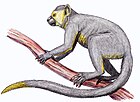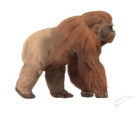Parapresbytis
| Parapresbytis Temporal range: Pliocene
| |
|---|---|
| Scientific classification | |
| Domain: | Eukaryota |
| Kingdom: | Animalia |
| Phylum: | Chordata |
| Class: | Mammalia |
| Order: | Primates |
| Suborder: | Haplorhini |
| Infraorder: | Simiiformes |
| Family: | Cercopithecidae |
| Subfamily: | Colobinae |
| Genus: | †Parapresbytis Kalmykov & Maschenco, 1992 |
| Species: | †P. eohanuman
|
| Binomial name | |
| †Parapresbytis eohanuman Borissoglebskaya, 1981
| |
Parapresbytis is an extinct genus of colobine monkey that lived in northeast Asia during the Mid-Late Pliocene. It is represented by single species known as Parapresbytis eohanuman, whose remains have been found throughout the Transbaikal area.
Taxonomy
[edit]Parapresbytis eohanuman was once considered a species of Dolichopithecus, but was found to be distinct.[1] There is debate as to its exact position within Colobinae, with some researchers considering it an ancestor to certain Asian colobines such as snub-nosed monkeys, and others considering it a member of a primitive colobine radiation that includes Dolichopithecus and left no descendants.[2] Parapresbytis seems to display a mosiac of distinct features shared with different living Asian colobine species, making its placement uncertain.[3]
Description
[edit]Parapresbytis was a large monkey, with an ulnar comparable in size to a chacma baboon. It has been estimated to weigh in at over 30 kg (66 lb).[3] Despite its size, the elbow morphology of Parapresbytis indicates that it was a climber and thus it can be assumed that it lived a mostly arboreal lifestyle. This matches well with the palaeoclimate of Pliocene northeast Asia, which at the time when Parapresbytis was living, would have been covered in warm forests.[1]
References
[edit]- ^ a b Naoko, E. (2007). "Distal humerus and ulna of Parapresbytis (Colobinae) from the Pliocene of Russia and Mongolia: phylogenetic and ecological implications based on elbow morphology". Anthropological Science. 115 (2): 107–117. doi:10.1537/ase.061008.
- ^ Masanaru, Takai; Maschenko, Evgeny N. (2009). "Parapresbytis eohanuman: the northernmost colobine monkey from the Pliocene of Transbaikalia". Primate Research Institute, Kyoto University. 5: 1–14.
- ^ a b Fleagle, John G. (2013). Primate Adaptation and Evolution. Elsevier Science. p. 356. ISBN 9781483288505.




